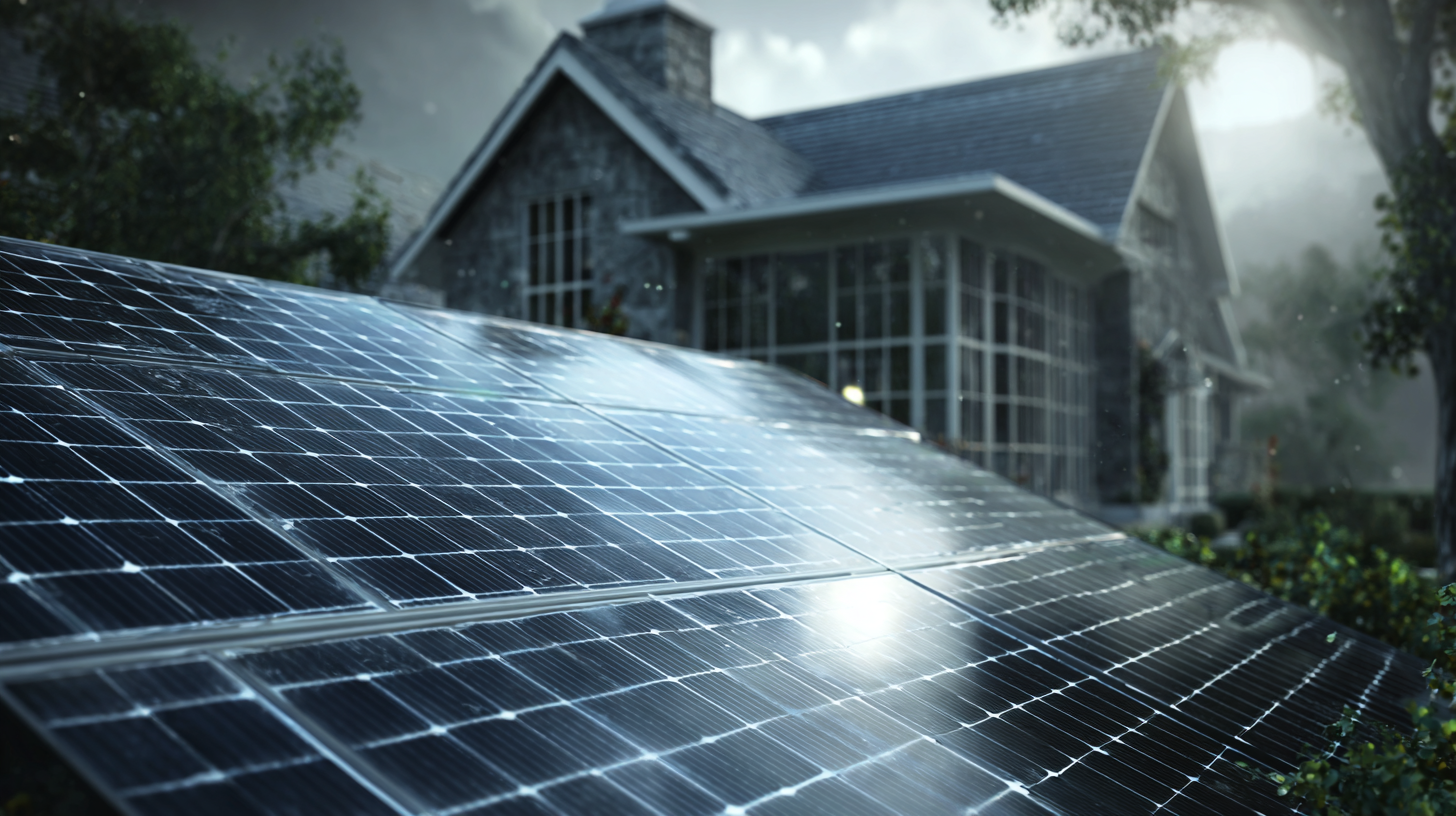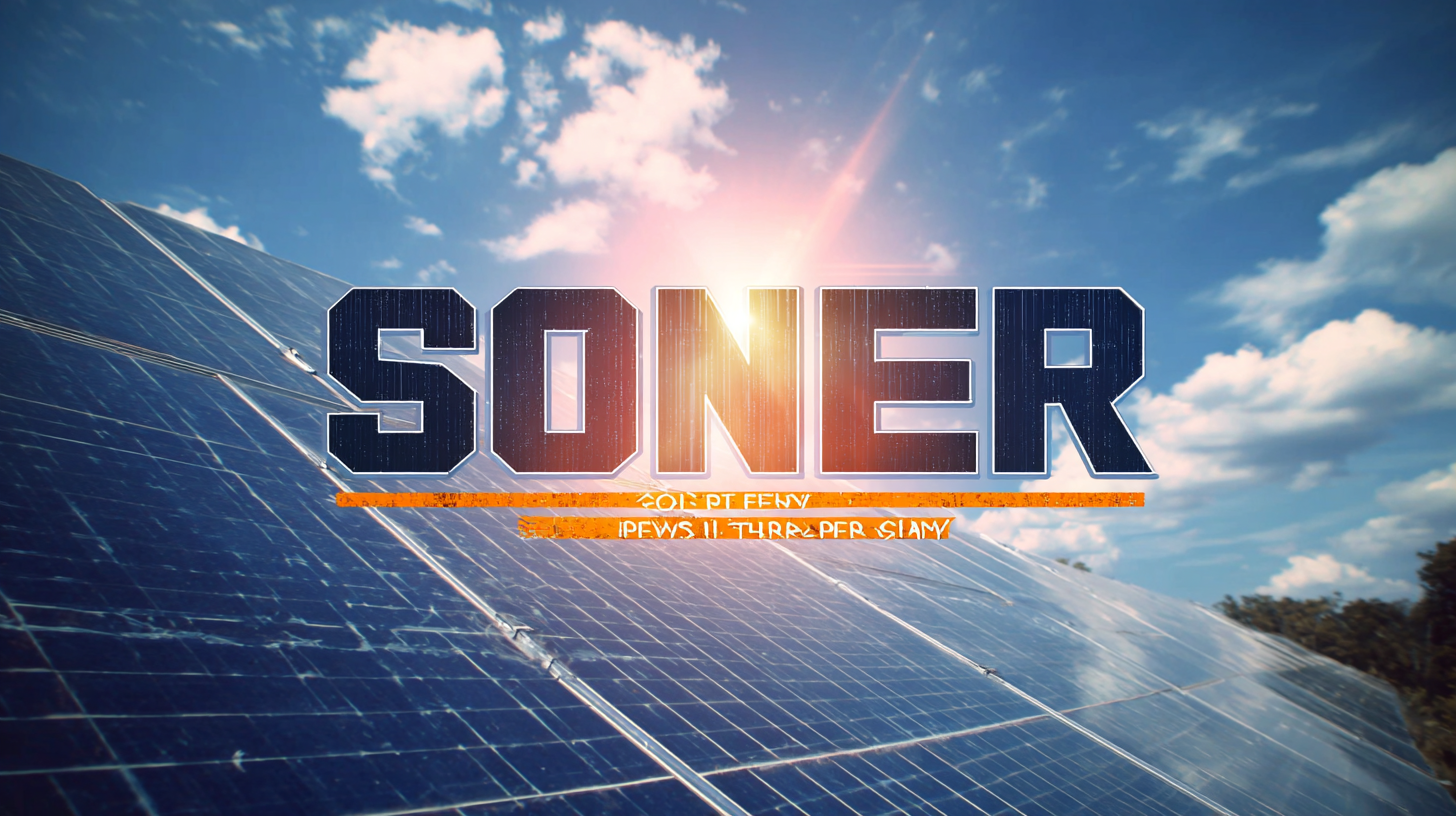Ultimate Guide to Choosing the Best Solar Energy Panels for Your Home
In recent years, the shift towards sustainable energy solutions has accelerated, with solar energy panels emerging at the forefront of this movement. As we approach 2025, technological advancements in solar panel design and efficiency promise to revolutionize how homeowners harness the sun's power. This ultimate guide will explore the latest trends in solar technology, helping you make informed decisions about the best solar energy panels for your home. We’ll discuss the various types of solar panels available, their unique benefits, and how these innovations can contribute to lower energy bills and a reduced carbon footprint. With the right knowledge, you can optimize your home's energy use while doing your part in the fight against climate change, all with the help of cutting-edge solar energy panels.

Key Factors to Consider When Choosing Solar Energy Panels for Your Home
When it comes to choosing solar energy panels for your home, several key factors come into play that can significantly impact your decision. First and foremost, assess the efficiency of the panels. Higher efficiency panels convert more sunlight into electricity, which means you'll need fewer panels to achieve your energy goals. Look for products with an efficiency rating above 20%, ensuring you maximize your rooftop space.
Another crucial factor is the warranty offered by the manufacturer. A long warranty period, typically around 25 years, not only indicates durability but also reflects the manufacturer's confidence in their product. This protection can save you from unforeseen costs due to panel failure or performance issues.
Tips: Conduct thorough research and read reviews of different brands to understand their long-term performance and customer service reputation. Additionally, consider the type of solar panel—monocrystalline panels tend to be more efficient and space-saving, while polycrystalline panels may be more cost-effective but require more space. Evaluating your energy needs and roof characteristics will lead you to the best solar solution for your home.
Understanding Different Types of Solar Panels: Pros and Cons
When it comes to selecting the best solar energy panels for your home, understanding the various types available is crucial. The most common options include monocrystalline, polycrystalline, and thin-film panels, each with distinct pros and cons. Monocrystalline panels, known for their high efficiency and sleek appearance, typically take up less space and offer better performance in low-light conditions. However, they tend to come with a higher price tag, which might be a consideration for budget-conscious homeowners.
On the other hand, polycrystalline panels are generally more affordable and are made from multiple silicon crystals, which makes them a popular choice for those looking to balance cost and efficiency. While they may occupy more space and offer slightly lower efficiency rates compared to their monocrystalline counterparts, they still provide reliable energy output for a variety of home sizes. Lastly, thin-film panels are lightweight and flexible, making them easier to install, especially in unconventional setups. However, they typically have the lowest efficiency and require more space to generate the same amount of power, which may not be ideal for every homeowner. Understanding these differences can help you make an informed decision that aligns with your energy needs and budget.

Evaluating Solar Panel Efficiency Ratings and Their Importance
When considering solar energy panels for your home, efficiency ratings are a critical factor that can significantly impact your long-term savings and energy production. Solar panel efficiency, typically ranging from 15% to 22%, indicates the percentage of sunlight that is converted into usable electricity. According to the National Renewable Energy Laboratory (NREL), high-efficiency panels can produce more power in limited space, making them ideal for homes with roof constraints. For instance, a panel with a 22% efficiency rating can generate approximately 20% more electricity than a standard 15% panel over the same period.
Moreover, the importance of efficiency ratings extends beyond mere energy output. A recent report by IHS Markit indicated that higher efficiency panels not only provide better performance but also increase property values. Homes equipped with premium solar technology often command a higher market price, demonstrating a trend toward sustainable investments. Therefore, when evaluating options, prospective solar homeowners should prioritize efficiency ratings alongside cost and warranty details to ensure they make an informed decision that aligns with their energy needs and financial goals. Choosing the right solar panel could mean a crucial difference in energy independence and environmental impact.
Solar Panel Efficiency Ratings
This bar chart represents the efficiency ratings of various solar panels, which is crucial for homeowners to consider when choosing solar energy solutions. Higher efficiency ratings lead to better energy production, which can significantly impact overall energy savings.
Comparative Analysis of Leading Solar Panel Brands for Home Use
When selecting solar panels for your home, it’s essential to conduct a comparative analysis of the leading brands available in the market. Renowned names such as SunPower, LG, and Canadian Solar each have their unique strengths. SunPower, known for its high efficiency and sleek designs, offers warranties that ensure long-term performance. On the other hand, LG provides excellent energy output and durability, making it a favored choice among homeowners focused on quality. Canadian Solar, with its cost-effective solutions, is perfect for those seeking a balance between performance and affordability.
**Tip:** When comparing solar panel brands, always look into their efficiency ratings and warranty options. A panel with a higher efficiency rate will produce more electricity, reducing your energy bills over time. Additionally, a robust warranty can offer peace of mind, ensuring your investment is protected against defects and performance issues.
Another critical factor in your decision-making process is understanding the installation and maintenance requirements of each brand. Some manufacturers offer more user-friendly installation processes and comprehensive customer support, which can significantly reduce hassles. Ensuring that your chosen brand has reliable service can make your transition to solar energy smoother.
**Tip:** Research customer reviews and testimonials regarding installation experiences and long-term service performance. This feedback can provide valuable insight into real-world experiences, helping you make a more informed choice for your home.
Ultimate Guide to Choosing the Best Solar Energy Panels for Your Home
| Criteria | Brand A | Brand B | Brand C | Brand D |
|---|---|---|---|---|
| Efficiency (%) | 18.6 | 19.2 | 20.3 | 21.0 |
| Power Output (W) | 300 | 320 | 340 | 360 |
| Temperature Coefficient (%) | -0.37 | -0.34 | -0.32 | -0.30 |
| Warranty (Years) | 10 | 12 | 15 | 20 |
| Cost per Watt ($) | 2.00 | 1.80 | 1.75 | 1.60 |
Future Trends in Solar Energy Technology and Their Impact on Homeowners
As we move toward 2032, homeowners are increasingly recognizing the potential of solar energy technology. The residential solar photovoltaic market is projected to reach a remarkable $123.23 billion, exhibiting a compound annual growth rate (CAGR) of 9.67%. This growth reflects a broader trend in renewable energy adoption, driven by technological advancements and a greater emphasis on sustainability. With solar panels becoming more efficient and affordable, homeowners are in a prime position to invest in these energy solutions for their homes.
In addition, the market for residential solar generators is anticipated to explode, expected to reach $1.46 billion by 2032 with an astonishing CAGR of 24.56%. This surge indicates not just an increase in demand but also a shift in how families are approaching their energy needs. As battery storage technology evolves, homeowners will benefit from enhanced energy independence, allowing them to store excess power generated during the day for use at night. These trends signal a transformative era in solar technology, ultimately empowering homeowners to make informed choices that favor both their budgets and the environment.
